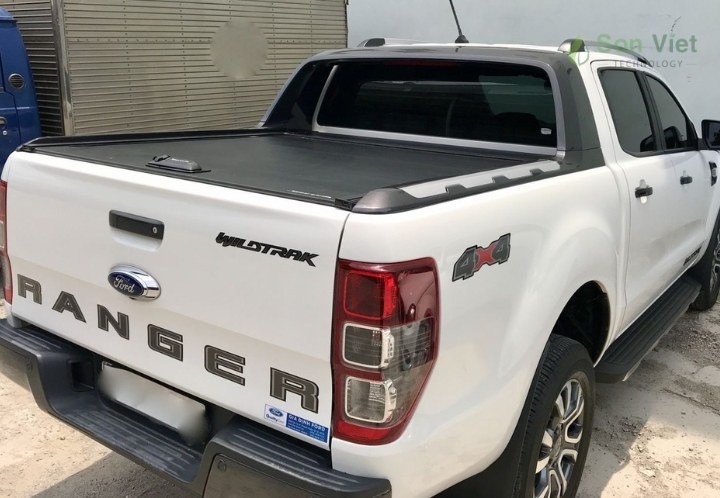In recent years, pickup trucks have become increasingly popular in Vietnam due to their versatility and flexible operation. However, a common question is whether pickup trucks have a lifespan limit, and which pickup trucks do not expire? This article from Xe Tải Mỹ Đình (My Dinh Truck), a reputable truck website, will provide detailed and up-to-date information on the 2024 pickup truck lifespan regulations, helping readers understand and make appropriate choices.
What is the Lifespan Limit for Pickup Trucks?
 Pickup trucks without lifespan limits for personal use, according to current 2024 regulations
Pickup trucks without lifespan limits for personal use, according to current 2024 regulations
To clarify the question of which pickup trucks do not expire, it’s essential first to understand the concept of a pickup truck lifespan limit. Lifespan limit is the maximum time a vehicle is legally allowed to operate. The purpose of this regulation is to ensure traffic safety, protect the environment, and maintain the technical performance of vehicles. For pickup trucks, especially imported models or small trucks, the issue of lifespan limits is even more important.
According to current regulations in Vietnam, the application of lifespan limits to pickup trucks depends on the purpose of registration and vehicle use. Specifically:
- Pickup trucks used for personal purposes: Generally not subject to lifespan limits.
- Pickup trucks used for commercial freight transport: May be subject to lifespan regulations similar to trucks.
Which Pickup Trucks Are Not Subject to Lifespan Limits?
 Popular pickup truck models like the Ford Ranger are typically registered for personal use and are not subject to lifespan limits
Popular pickup truck models like the Ford Ranger are typically registered for personal use and are not subject to lifespan limits
To answer the question which pickup trucks do not expire, we need to consider current legal regulations. Accordingly, not all pickup trucks are subject to lifespan limits.
Pickup trucks without lifespan limits are those registered for personal or non-commercial use. This means that if you buy a pickup truck for personal and family travel needs, and not for commercial transport, your vehicle will not be limited in its usage time. This is a significant advantage that leads many customers to choose pickup trucks for personal purposes.
However, it is important to note that pickup trucks registered and used for freight transport or business services will be subject to lifespan regulations similar to trucks.
Some popular pickup truck models commonly registered for personal use and not subject to lifespan limits:
- Ford Ranger: The most popular pickup truck model in Vietnam. Ford Rangers registered for personal use are not subject to lifespan limits.
- Toyota Hilux: Renowned for its durability and quality, the Toyota Hilux is also a popular choice for personal use and is not subject to lifespan limits.
- Isuzu D-Max: Highly rated for its powerful performance and fuel efficiency, the Isuzu D-Max also falls into the category of pickup trucks without lifespan limits when registered for personal use.
- Mitsubishi Triton: With its impressive Dynamic Shield design and stable performance, the Mitsubishi Triton is also a worthy consideration for those seeking a pickup truck without lifespan limits.
- Mazda BT-50: Featuring a unique KODO design style and equipped with amenities, the Mazda BT-50 is also on the list of pickup trucks not subject to lifespan limits when used for personal purposes.
Important Note: To ensure a pickup truck is not subject to lifespan limits, owners must ensure the vehicle is registered for personal, non-commercial use from the outset. Changing the purpose of use after registration may result in the vehicle being subject to lifespan limits.
Lifespan Regulations for Pickup Trucks in Commercial Transport
 Pickup trucks carrying goods and used for commercial transport may be subject to a 25-year lifespan limit
Pickup trucks carrying goods and used for commercial transport may be subject to a 25-year lifespan limit
In contrast to personal pickup trucks, pickup trucks used for freight transport are subject to lifespan regulations similar to small trucks. According to current regulations, the maximum lifespan for this type of vehicle is 25 years, calculated from the year of manufacture. After this period, the vehicle will not be allowed to circulate to ensure safety and environmental protection.
This regulation is applied to control the quality and safety of freight transport vehicles, especially as they frequently operate with heavy loads and high frequency.
Why is There a Difference in Pickup Truck Lifespan Limits?
 The difference in pickup truck lifespan regulations arises from different intended uses
The difference in pickup truck lifespan regulations arises from different intended uses
The difference in lifespan regulations for pickup trucks based on the registered purpose of use stems from several legitimate reasons. This classification helps state management agencies more easily manage vehicles while ensuring traffic safety and environmental protection effectively.
Personal pickup trucks typically have lower usage frequency, carry lighter loads, and are maintained more carefully. Therefore, they pose less risk to traffic safety and have less negative impact on the environment compared to transport vehicles.
Conversely, pickup trucks for freight transport often operate at high intensity, carry heavy loads, are more prone to wear and tear, and have a greater potential to cause environmental pollution. Therefore, applying lifespan limits is necessary to ensure safety and minimize adverse environmental impacts.
Other Lifespan Regulations Related to Pickup Trucks in 2024
 Stay updated on the latest 2024 pickup truck lifespan regulations to ensure legal compliance
Stay updated on the latest 2024 pickup truck lifespan regulations to ensure legal compliance
In 2024, regulations regarding pickup truck lifespan limits continue to be maintained, with some notable points aimed at strengthening management and ensuring safety:
- Stricter periodic inspections: Used pickup trucks or those used for commercial transport will undergo stricter periodic inspection procedures to ensure they meet technical safety and environmental protection standards.
- Strict penalties for vehicles exceeding lifespan limits: Cases of pickup trucks exceeding lifespan limits that still intentionally operate will be severely penalized according to legal regulations.
- Simplified registration procedures for personal vehicles: Pickup trucks registered for personal use still benefit from simplified registration procedures and less control over lifespan, as long as they meet current technical and emission standards.
Conclusion
In summary, which pickup trucks do not expire depends entirely on the purpose of use and vehicle registration. Pickup trucks for personal use are not subject to lifespan limits, while vehicles used for freight transport have a maximum lifespan of 25 years. This regulation is maintained and may have minor adjustments in 2024 to optimize traffic safety and environmental protection.
Understanding lifespan regulations helps users make informed decisions about purchasing and using pickup trucks that are suitable for their needs and comply with the law. To ensure accurate and up-to-date information, you should regularly follow announcements from authorities or consult experts at Xe Tải Mỹ Đình.
Hopefully, this article has adequately answered your questions about “which pickup trucks do not expire” and the regulations related to pickup truck lifespan in 2024. Don’t forget to follow Xe Tải Mỹ Đình to update more useful information about trucks and related issues!
Contact Information:
- Website: https://xetaimydinh.com/
- Hotline: 09xxxxxxxxx (Xe Tải Mỹ Đình Contact Number)
- Fanpage: https://www.facebook.com/xetaimydinh
